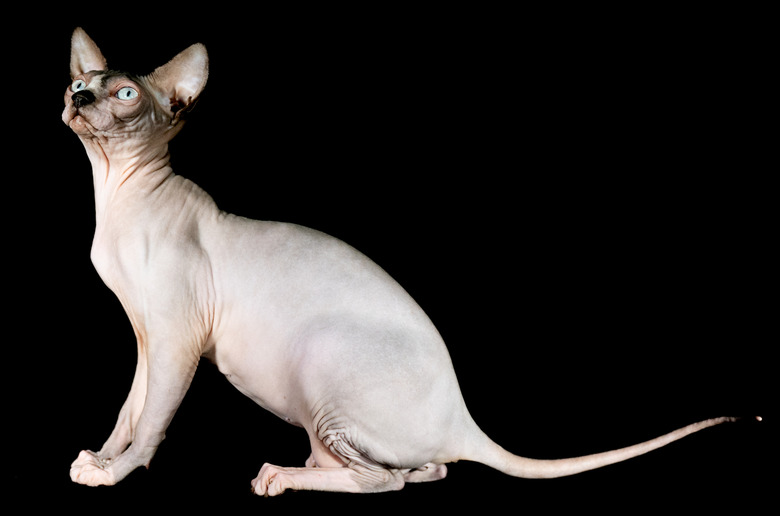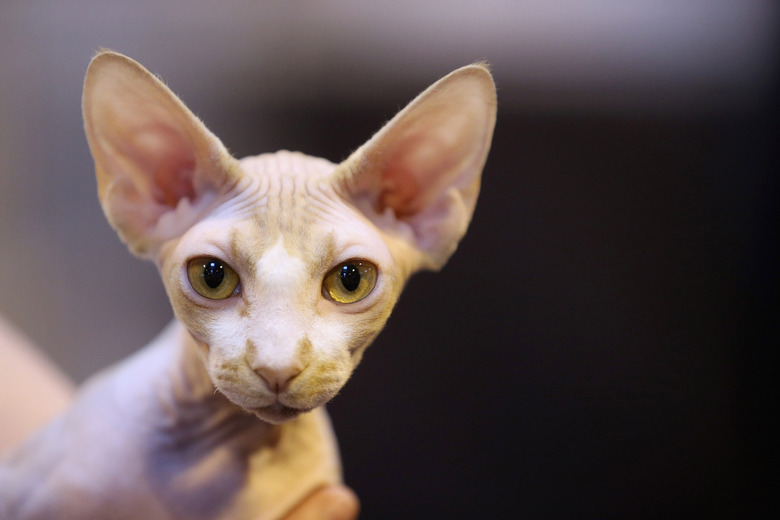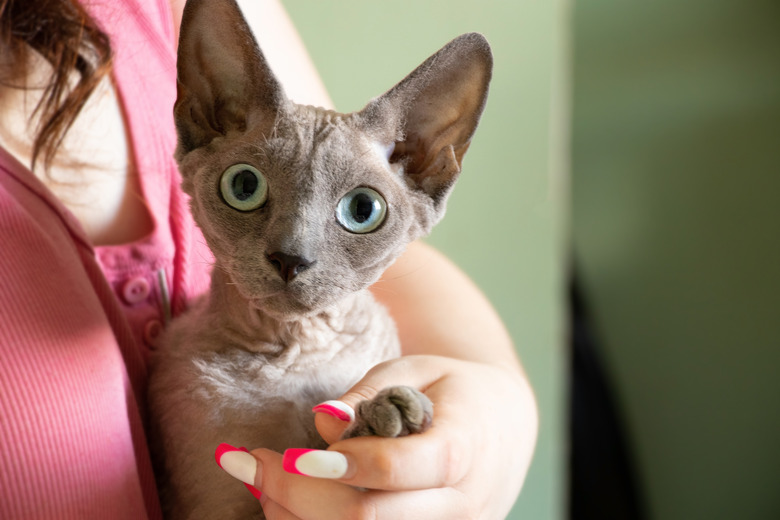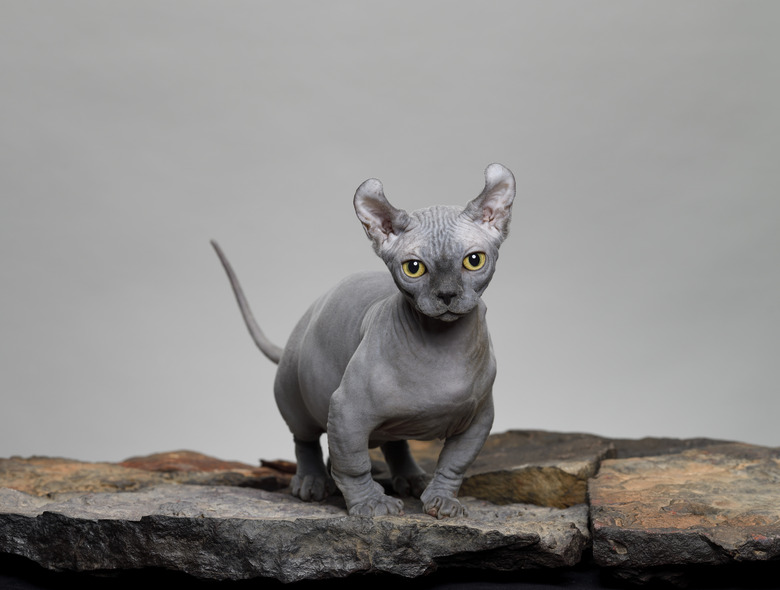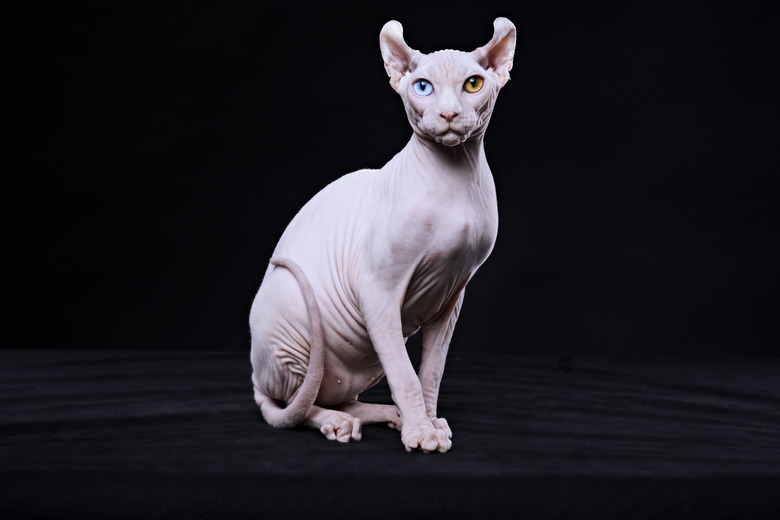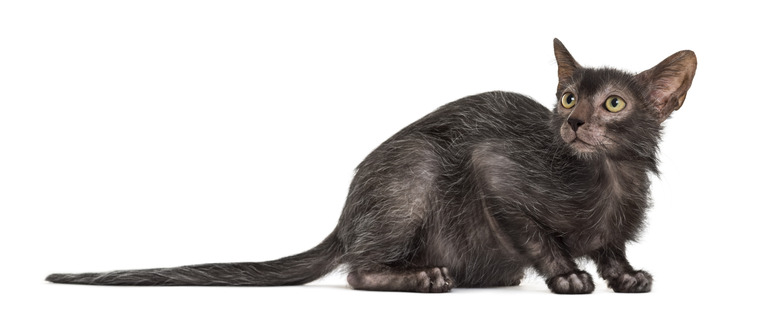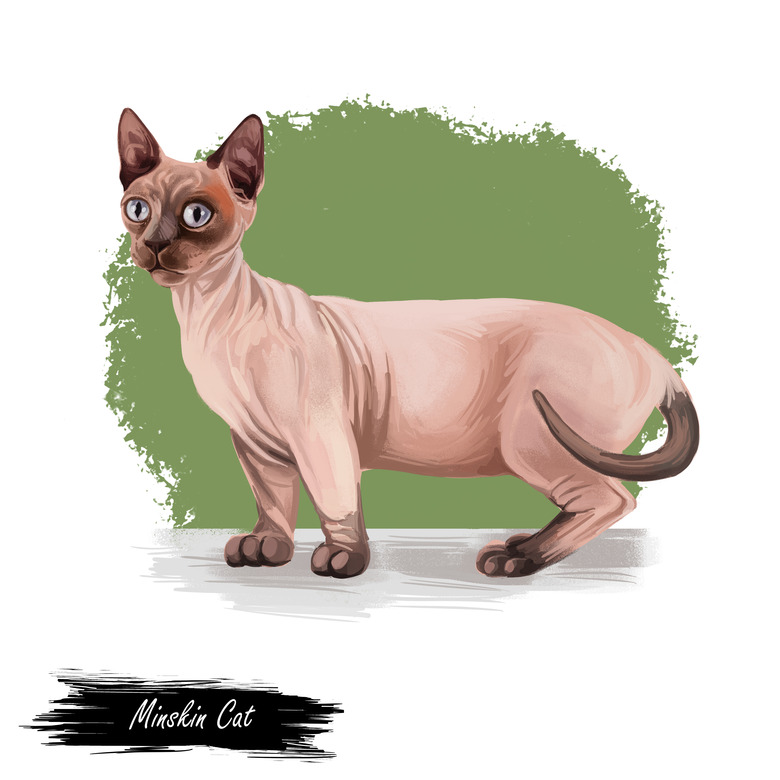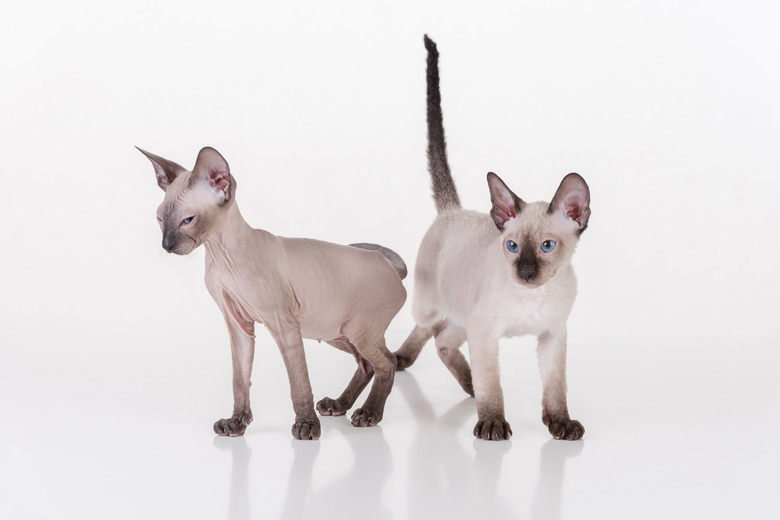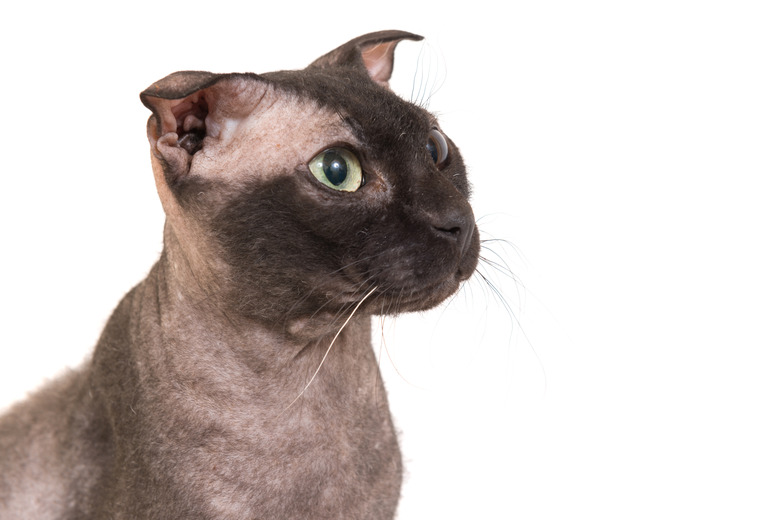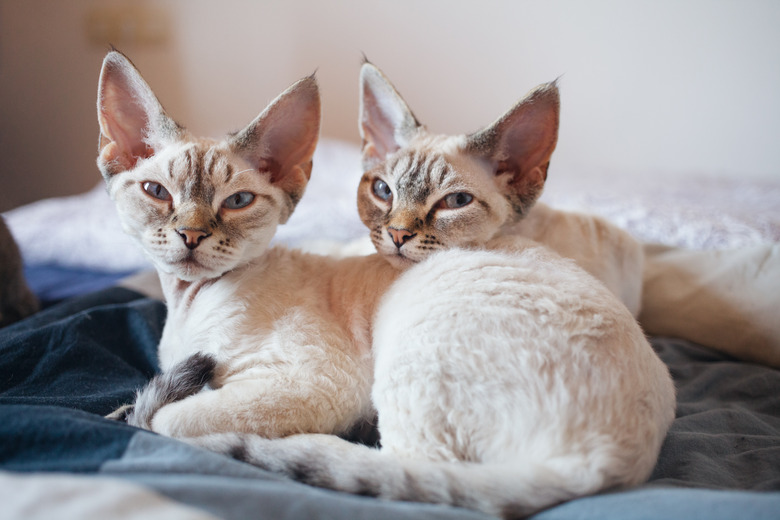List Of Hairless Cat Breeds For Your Next Bald & Beautiful Cat Friend
A cat without fur is an unusual sight in the cat world, and these cats are much less common than other breeds of cat. They have a unique appearance and some are fully or partially hairless while others appear hairless but are actually covered in short peach fuzz. Explore some popular hairless cat breeds for your next feline companion.
Many people think that hairless cats are hypoallergenic but this is not necessarily the case. No cat is truly hypoallergenic, but as hairless breeds don't shed like other cat breeds, there is likely to be less dander and allergens in the air that can trigger a reaction.
1. Sphynx
1. Sphynx
The sphynx cat is a medium-sized cat with a muscular body, loose skin, and very large ears. While they appear to be completely hairless, they are actually covered in fine, downy hair. The breed originated in Canada when a hairless kitten was born with a natural genetic mutation. These high-energy cats are known for being outgoing, intelligent, and affectionate.
There are also several hairless sphynx hybrid cat breeds, such as the sphynxiebob, a cross between a sphynx and an American bobtail.
Sphynx quick facts
Weight: Females: 7 – 10 pounds, males: 8 – 14 pounds
Life Span: 15 years or more
Coloring: All coat colors and patterns
What is the difference between a hairless cat and a Sphynx cat?
What is the difference between a hairless cat and a Sphynx cat?
When most people think of hairless cats, the sphynx cat is the breed that immediately comes to mind with their large ears and lemon-shaped eyes. However, the sphynx is one of several hairless cat breeds.
2. Bambino
2. Bambino
The bambino is one of the sphynx hybrid breeds. They are a cross between the sphynx cat and the munchkin cat breed. The cats live up to their name, bambino, which is Italian for baby, as they are quite small with the munchkin's short legs. Bambinos tend to be affectionate, outgoing, and playful.
Bambino quick facts
Weight: 4 – 9 pounds
Life Span: 9 – 15 years
Coloring: Usually light cream or darker black
3. Donskoy
3. Donskoy
The Donskoy is a Russian cat breed first found in Rostov-on-Don, Russia. The breed is recognized by the International Cat Association (TICA) and there are actually four accepted coat types:
- Rubber bald: Both kittens and adults are hairless
- Flocked: Appears hairless but is shorthair cat covered with soft, fine, hair
- Velour: Kittens are born with hair except for a bald spot on the head. Cats may lose hair except for the fur on the face, legs, and tail
- Brush: Cats have either hairy or soft fur and may develop bald spots as they age
Also called don sphynx or Russian hairless, Donskoy cats are described as social, gentle, and elegant. They are also known for their playfulness and inquisitive nature.
Donskoy quick facts
Weight: 8 – 15 pounds
Life Span: 12 – 15 years or more
Coloring: All coat colors
4. Dwelf
4. Dwelf
Dwelf cats are a mixed breed of sphynx, American curl, and munchkin cat breeds. This hairless breed is named for its small size and elf-like ears. These small domestic cats may be small in stature but they have big personalities and tend to be affectionate, sociable, and active.
Dwelf quick facts
Weight: 4 – 9 pounds
Life Span: 12 – 15 years
Coloring: Hairless with pink, dark, or black markings
5. Elf
5. Elf
The elf cat breed is a cross between a sphynx and an Amercian curl. The resulting cats are nearly hairless like the sphynx and have the curled-back ears of the American curl. The breed is generally described as social, affectionate, playful, and intelligent.
Elf quick facts
Weight: 10 – 15 pounds
Life Span: 8 – 14 years
Coloring: All colors
6. Lykoi
6. Lykoi
The lykoi cat is a partially hairless cat breed with some cats being nearly hairless and others having nearly a full coat of fur. Their name comes from the Greek word for wolf and they are sometimes referred to as werewolf cats. The breed is the result of a genetic mutation that occurred in a feral cat population in the United States. Lykoi cats are outgoing, friendly, and intelligent.
Lykoi quick facts
Weight: Females: 6 – 9 pounds, males: 7 – 12 pounds
Life Span: 12 – 15 years
Coloring: All coat colors, although black roan is the most common
7. Minskin
7. Minskin
The minskin cat breed is a mixed breed cat that is primarily a cross between sphynx and munchkin cats along with Burmese and Devon rex cats. There are three main coat types:
- Hairless
- Furpoint or hairless except for the feet, tail, and ears
- Fully coated
These small, energetic cats are sociable, loving, and playful.
Minskin quick facts
Weight: 4 – 6 pounds
Life Span: 12 – 16 years
Coloring: All coat colors
8. The Peterbald
8. The Peterbald
The Peterbald cat breed originated in Russia and is a cross between Donskoy or don sphynx cats and oriental shorthair cats. There are several accepted coat types including completely hairless, shorthair with a peach fuzz texture, and varying hair lengths with either downy or wiry hair. Some Peterbalds even have a full coat of fur. The cats are generally loyal, intelligent, and active.
Peterbald quick facts
Weight: Females: 5 – 7 pounds, males: 7 – 10 pounds
Life Span: 12 – 15 years or more
Coloring: All coat colors
9. Ukrainian Levkoy
9. Ukrainian Levkoy
The Ukranian levkoy is one of the rarest cat breeds in the world. They originated in Russia when a breeder crossed a Scottish fold with a Donskoy. They are not completely hairless and have downy fur. The breed is described as dog-like, both for their appearance and folding ears and for their playful and affectionate personalities.
Ukrainian levkoy quick facts
Weight: 11 – 15 pounds
Life Span: 15 – 20 years
Coloring: All coat colors
10. Devon Rex
10. Devon Rex
Devon rex cats are not a hairless cat breed, but they are unique shorthair cats. Their coat is very short and curly and the breed rarely sheds. They have big eyes and large ears that can be described as Yoda-like. This people-oriented breed is described as loyal, active, and playful.
Devon rex quick facts
Weight: Females: 5 – 7 pounds, males 7 – 9 pounds
Life Span: 14 – 17 years or more
Coloring: All coat colors
Here are some FAQs people often have about hairless cats:
Are hairless cats hypoallergenic?
No cat is truly hypoallergenic, including hairless cats. This is because the protein that causes allergies is actually found not just in the fur and dander, but also in the cat's skin and saliva. Since hairless cats shed less than other breeds, family members who are allergic to cats may be less likely to experience an allergic reaction, but they will still need to take precautions, including:
- washing their hands after petting their cat
- not allowing the cat to lick them
- keeping the cat off of the bed
Do hairless cats need to be groomed?
Hairless felines do still need to be groomed. While they don't have fur that needs to be brushed, some breeds may need regular baths to deal with oily buildup on the skin. In addition, all cat breeds need to have their nails trimmed, their eyes and ears cleaned, and their teeth brushed.
What else is unique about hairless cats?
Since these breeds don't have a winter coat, or even a summer one, hairless cats tend to get cold easily. If you decide to bring a hairless cat into your home, you will need to make sure to keep the home warm and consider sweaters or jackets for the cat when it is chilly. Hairless cats like to snuggle into blankets when they are sleeping.
These breeds are also prone to skin problems including sunburn. Be sure to apply sunscreen if your cat enjoys sunbathing.
How many types of hairless cats are there?
There are approximately five recognized hairless cat breeds. The Cat Fanciers' Association (CFA) recognized the hairless sphynx cat breed, as well as the Devon rex and lykoi cat breeds that have little, if any, hair. TICA also recognizes the Peterbald and Donskoy cat breeds. There are also several other breeds not yet recognized by these organizations as well as mixed-breed hairless cats.
References
- Cleveland Clinic: Pet Allergies
- The International Cat Association: Donskoy
- Cats.com: Ukrainian Levkoy Cat
- The International Cat Association: The Peterbald Breed
- Petkeen: Minskin Cat: Breed Info, Pictures, Temperament & Traits
- Petkeen: Dwelf Cat Breed: Pictures, Temperament & Traits
- ExcitedCats: Elf Cat Breed Info: Pictures, Temperament & Traits
